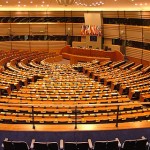Most European governments have dealt with some serious issues in their countries. Some of these issues were induced from struggling governments trying to escape the prolonged Eurozone crisis.
At first glance, the economic oscillation created within the Eurozone could have been a major factor leading voters to choose “alternative” parties. This is understandable as a deteriorating economic situation converts to frustrations resulting in irrational voting behaviors. The Anti-something parties that are gaining territory throughout the European Union, mainly exploit such common frustration with populist and sometimes manipulative speeches. Their political debates are entangled between topics on how things were much better before the EU came to existence, or against the hidden malicious dragon of capitalism, or against multiculturalism that bombed their national societies. By doing so, they put to use the weak memory of Europeans and their relativism of the situation.
Apparently not many remember that before the de facto initiation of the European Union (with the European Coal and Steel Community) there was a War and by no means were peoples’ lives better than now.
Nevertheless, a look into the broader picture we observe that voters in countries less (or not at all) influenced from the crisis, have almost the same voting patterns concerning far–right parties. So the effect of the Eurozone crisis in this election is not a solid argument for all the countries. This is especially true for countries where the crisis had less or no effect at all, including most of the Nordic countries or others, such as Netherlands or Austria. It was striking to see that even the Neo-Nazis in Germany managed to have their seat, despite the fact that Germany’s economy is rampant, constantly rising and shining every passing year. The same goes for Austria, where a controversial party like Freedom Party of Austria (FPÖ) exceeded the electoral expectations, despite the country’s lack of being affected from the crisis. So apparently the reasons behind such an outcome are not solely due to the supposed Eurozone crisis.
Overall the partygraphy of European Parliament(EP) has a slightly different design now, even though both groups of center-right European People Party (EPP) and center-left Progressive Alliance of Socialists and Democrats (S&D) are still in the lead. However, is too early to project the future coalitions and decision of the EP, but surely with all these Anti-something parties it will be tougher to keep up a healthy European dream.
What do the far-right wings offer?
Despite their political program and their promises to save the countries from “something” (put your individual countries imaginary and real problems in the something) unfortunately they have become one of the few alternatives in the political atmosphere of Europe. Most of these parties are at times becoming the only alternative within their own country and also within the European Union itself. As many would claim, the votes gained from NF in France, were primarily a sign of protest against the current political devise of Mr. Hollande and France role in EU. Some would argue that the French are annoyed by the compromises and declining power of France in the EU.
The same goes for most of the votes that the radicals, being left of right, got in these elections across EU (despite the fact that it cannot be easily generalized). As could be assumed, these votes were not won because the extremists did a great job, but because the leading parties did a poor job. Personally I would not consider this a wise decision, but nevertheless I understand.
Most of the far-right party programs are ephemeral and temporary as the party itself. If UKIP’s objective to have UK out of the EU, by any chance gets fulfilled, then normally this party should cease to exist, unless of course Mr. Farage alters the party’s objective to world domination. The same temporality could be assumed for most of the Anti-EU parties, which wouldn’t exist without the existence of EU. Honestly, they should also voluntarily renounce their salaries from the EU institutions if their intentions are genuinely aligned with their objectives.
What did we learn from this election?
First of all we should not forget the obvious. Only 43.1% of the 375 million eligible voters participated in these elections. Slovakia hit the bottom of all time voting with 13% of voters. Thus, the rest is a huge and fundamental amount of people who are not willing to express their thoughts through voting, a number which cannot be easily ignored.
Neither can we avoid the arguments stressing that the European Union per se is becoming a bureaucratic entity with luxurious venues in Strasbourg or Brussels, or the opinions that proclaim a lack of democratic legitimacy in some of the European institutions. There is a need of more accountability towards the people. This election result puts a difficult task ahead for EU’s work for more efficiency and tangible results. There is a big gap created among the information running through the EU institutions’ corridors and the information that is reaching people. This is a dangerous gap, which needs to be closed as a primary condition for better democratic decisions resulting in better democracy.
The Anti-EU parties are doing a great job in misinforming and injecting all kind of all horrible unrealistic scenarios in people’s hearts, despite some of these scenarios being so unrealistic that they cannot graduate from fiction.
Personally I still believe that the EU is the best thing that could have ever happened to this continent, but that doesn’t mean that there is no need for change. There are probably a thousand other lessons that we can conclude from this election, but one thing is for sure, the clear message out of this voting is: Change!
A humanist with a strong passion for politics.



